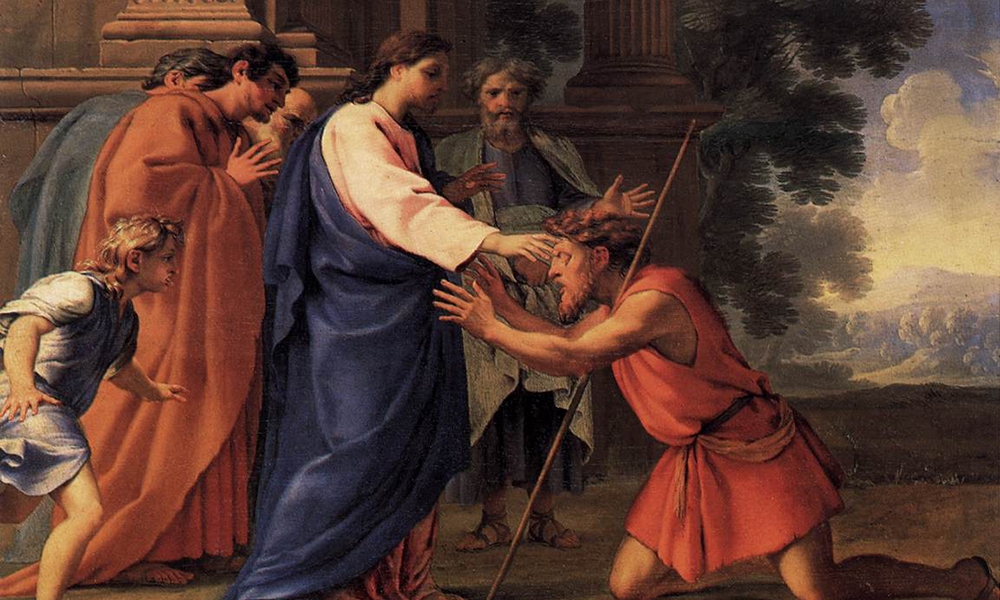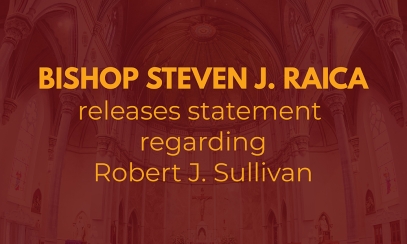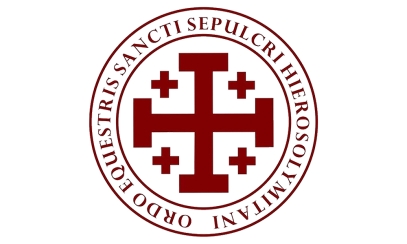
Rejoicing in our Lenten Journey
Bishop celebrates Laetare Sunday
Bishop celebrates Laetare Sunday
On March 30, the bishop celebrated Mass at the Cathedral of St. Paul, marking the second scrutiny for those preparing to be baptized during this year’s Easter Vigil. The complete text of his homily follows herein.
On March 30, the bishop celebrated Mass at the Cathedral of St. Paul, marking the second scrutiny for those preparing to be baptized during this year’s Easter Vigil. The complete text of his homily follows herein.
My sisters and brothers, along with our parishioners and guests, we also warmly welcome our catechumens who will be baptized at our Easter Vigil for this 2nd Scrutiny, in which we will pray over them as they anticipate the great night when they will be baptized into our faith. Today, however, this Fourth Sunday of Lent, which is also known as Laetare Sunday(or “Rejoice” Sunday) is a reminder that we are now beyond the mid-way point of our Lenten journey. So, we rejoice because our journey is taking us to our ultimate destiny – union with Christ – that we have yet to imagine for ourselves, even though we have already had a glimpse of it from time to time. Of course, from our vantage point, (and how providential it is for us), we already know the ending that awaits us and what the end reality for a Christian is like. It should be a constant reminder to inform our lives every day as a true guide for knowing ourselves and our ultimate life meaning.
In the Gospel today, we meet up with a man, “born blind,” as the Gospel says. He doesn’t come with great credentials (i.e., someone with advanced degrees in theology or widely charismatic figure in the society who would have a sense of automatic trustworthiness). He was among the outcasts, living in the periphery, relegated to begging for what little life he had. The culture of the day – the way they looked at reality – suggested a certain bias and prejudice that this man must have been born blind because of something his parents or ancestors did or may have done in their previous lives. It was physical manifestation of punishment for their sins transmitted to future generations. Jesus, in a cringeworthy moment, says, “No! You’ve got it all wrong.” The real issue is that through the circumstances of life, the “works of God might be made visible.” As long as Christ is present and here now, He is “the light of the world” and, consequently, we can see - we can see what He’s doing all around us. It is not helpful to get bogged down in “how” all this happens but that we do see it. And, to a certain extent, we can trace our visual awakening to an event – the encounter we had with Jesus Christ – like the blind man.
Even when he gave vibrant indisputable testimony about what happened, a truly remarkable claim, others remained incredulous. They were blinded to God’s action in the world and thus, could not “see” the deeds that God was doing right in front of their own eyes. They began to find excuses or ways to reduce their experience – “He did it on the Sabbath” so He cannot be a “man of God.” They even doubted that the blind man was even blind! What does the man do? He sticks to facts: “I was blind … I washed my eyes as that man – Jesus – told me to do … now I see!” Even his parents defer to their son and don’t want to get entangled in the intricate legal points of the case. The blind man continues to give witness to what he has met. It is something he could neither ignore nor deny. The facts remain. The truth remains, not opinions or feelings. The blind man saw and confessed his belief in Christ as the Son of God to the amazement of many.
Our challenge as Christians, from the very first moment when we became aware of the world around us, is to be aware of what’s happening around us. That is, open our eyes and see the world, see life, see relationships in a new way. We can say that there is a new acuity going on: We see, but we see more! One only needs to follow the experience we’ve encountered on the way. One thing is true – the more the disciples followed, the more they desired to follow. The more they followed, the more they saw. The more they saw, the more they believed. The more they believed, the more they could not unsee the reality and drama of life taking place around them.
As Christians, we oftentimes worry about who we are, or we hide who we are, wanting to “blend in.” Or we think that somehow we are confined or blocked by the tangle of webs and inconsistencies of our lives. We don’t feel that fullness. Rather, we often feel ourselves reduced to the least common denominator of our lives by resisting any attempt to challenge ourselves, to change our heart, or to seek the challenge that will make our Christian life even more dynamic.
Oftentimes, we find the fuller expression of our lives out of reach because of the failings that continue to haunt and plague us, concluding, as many do, with the excuse, “I’m only human!” Is our humanity, our human life defined by our sins and failings, our lowest points? Are we defined merely by the physical or psychological weaknesses we have? Am I defined by the limitations of my age – too young, too old, too tired? Have we cheapened ourselves to think of ourselves only defined by what plagues us and weighs us down? This is what some think and why they are, or may be, resistant to a provocation of Christ in life. That is what so many want us to believe: “It can’t be done. … It’s impossible.” So, I give up rather than soldiering through by the grace God gives us!
Rather, “to be human” means to be generous, to be good, to be just. It is a positive and optimistic attitude we have even when everything else seems so hopeless! It is Christ Himself Who brings us out of the darkness that keeps us confined to our solitude and loneliness and alienation into friendship, family, and faith - to a life where we can experience the true freedom of seeing more, of hearing more, and of loving more like never before! It is the fullness of who we are created to be: the image of God. It is Christ Who is our “light,” leading us to a greater experience of life not satisfied with the status quo or our complaints of inadequacy. That’s why, for Christians, life is so very important because each person is an adventure and on a journey in which we have been given the grace and freedom to write the ending of the story. Yes, it is a lifelong process, one that begins at each moment and continues. These are things that are not taught in classrooms – they are the lessons of life that take a lifetime to accomplish.
As Christians, we conform ourselves more and more to Christ. With Christ, we learn to live the fullness of the dream that God had when He created “man and woman in His own image and likeness” and “Who knew us even before we were born.” On this Rejoice Sunday, and through these remaining weeks of penance and prayer and works of charity, may we find the blessings of God to recognize that with Christ we can see and experience the hundredfold, becoming new and refreshing witnesses of hope in a world that wants to cling to the darkness. So, our rejoice – laetare – is that our Lenten journey is nearing an end and will transform us more and more into the very image of Christ, Whose name we bear. With Christ we will have our thirst slaked, our sight restored, and a new life given to us in order that we, too, become a light and life for the world! May God bless you all!



